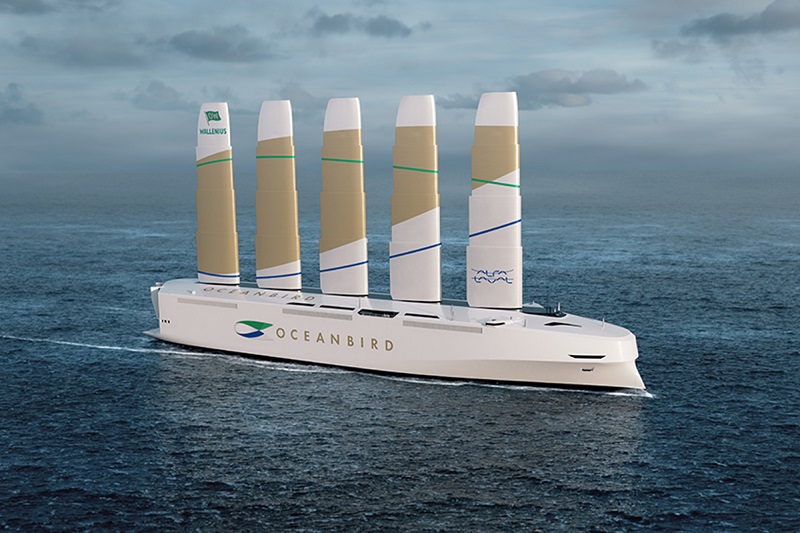EarthTalk®
From the Editors of E – The Environmental Magazine

A few pioneering companies — like Wallenius with its OceanBird concept — are harnessing the power of the wind to reduce the carbon footprints of their cargo shipping operations.
Dear EarthTalk: Since when did cargo ships start using wind power (again)? Does this save us from a lot of carbon emissions? — Bill H. Elizabeth, NJ
To many, sailboats invoke either the 18th century “Age of Sail” or preppy regattas. But some environmentalists and engineers are looking past these connotations and rewiring the art of sailing to suit modern technology.
In fact, the 21st century Age of Sail is already in its infancy, due to concerns about fossil fuel shortages that are used in exorbitant amounts to power enormous cargo ships.
This rewiring of sailing matters because of the immense emissions that cargo ships produce. Because they consume fossil fuels, much of our supply chain is riddled with emissions problems. In fact, marine emissions contribute to ocean acidification and greenhouse gas buildups in the atmosphere, and even an alarming feedback loop between the two.
This may influence, among other things, coral reef die-offs. Cargo ships that use sails could partially or even completely eliminate the environmental impacts of diesel usage.
Very practical examples abound. Wine companies like Grain de Sail are not just paying lip service to sustainability or otherwise “greenwashing” their products. They are making sure their products truly reject fossil fuel usage by using canvas sails on a boat similar to 19th century schooners. Its ship uses 100 percent wind energy to propel itself across the ocean.
OceanBird, manufactured by Wallenius, is another innovation. OceanBird is a cargo ship that can reach speeds similar to normal cargo ships using high tech modifications of sails that are closer to helicopters or airplane wings than canvas sails. They use changing air currents and automated shifts in the positioning of the “wings” to maximize speed of transport. While this may sound like science fiction, OceanBird’s experimental prototype will soon be on the market.
Grassroots efforts to support wind-powered cargo ships are still in their infancy, but you can “vote with your wallet” to support companies like Grain de Sail that use cargo sailboats to propel their goods across the water, if you can afford luxuries like their wines.
If not, you can do your part to avoid the shipping industry by shopping at your local thrift store or farmer’s market for local or secondhand goods.
Wind-propelled technologies are not only more picturesque than diesel-based cargo ships belching out emissions, dirtying the air and creating noise pollution. They have an opportunity to revolutionize the shipping industry and break our addiction to fossil fuels.
To paraphrase Jimmy Dean, “[We] can’t change the direction of the wind, but [we] can adjust [our] sails to always reach [our] destination.” And when the end destination is a world free from fossil fuels, the journey is worth it.
CONTACTS
Grain de Sail, graindesailwines.com
The Oceanbird Concept, walleniusmarine.com/our-services/ship-design-newbuilding/ship-design/wind-powered-vessels
EarthTalk® is produced by Roddy Scheer & Doug Moss for the 501(c)3 nonprofit EarthTalk.
See more at https://emagazine.com
To donate, visit https//earthtalk.org
Send questions to: question@earthtalk.org
